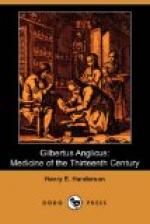The varieties of difficulty of breathing are classified under the titles of asma, dispnea, orthomia, hanelitus and sansugium. The last title is given to a condition in which, as Gilbert says, “A superfluous humor is abundant in the superficies of the lung, which compresses that organ and renders it unable to dilate in inspiration. Hence it labors in inspiration like a leech, from which the dyspnea derives its name.”
Under the single title of “cardiaca passio” are included all possible diseases of the heart. The symptoms of this disease are said to be “palpitation, twitching of the limbs (saltus membrorum), perspiration, weakness of the nerves, facial pallor, weakness of the body as in hectic fever or phthisis, excessive pain and faintness over the precordia, a disposition to sleep and often constipation.” The treatment is, of course, entirely symptomatic.
Diseases of the digestive apparatus are discussed under the headings of difficulties of deglutition, canine appetite, bolismus (boulimia), disturbances of thirst, eructations, hiccup, nausea and anorexia, vomiting, anathimiasis (gastric debility), anatropha and catatropha (varieties of obstinate vomiting), pain in the stomach, abscess of the stomach, salivation, colic, dysentery and diarrhoea, intestinal worms, hemorrhoids, rectal tenesmus, prolapsus ani, fistula in ano, diseases of the liver, dropsy, jaundice and diseases of the spleen.
Abscess of the stomach sometimes manifests a circumscribed tumor, and accordingly, probably includes cancer of that organ. Approved remedies are the Al’mirabile, the stomatichon frigidum, calidum or laxativumvum, etc., stereotyped formulae, of which the composition is carefully recorded.
Dysentery is a flux of the bowels with a sanguinolent discharge and excoriation of the intestines. A variety called hepatic dysentery, however, lacks the intestinal excoriation. Diarrhoea is a simple flux of the bowels, without either the sanguinolent discharges or the intestinal excoriation. Lientery is a flux of the bowels with the discharge of undigested food, occasioned by irritability (levitas) of the stomach or intestines. Colical passion and iliac passion derive their names from the supposed origin of the pain in the colon or ileum, a remark which furnishes occasion for the statement that Gilbert divides the bowels into six sections, viz., the duodenum jejunum and ileum, and the orobus, colon and longaon (rectum).




